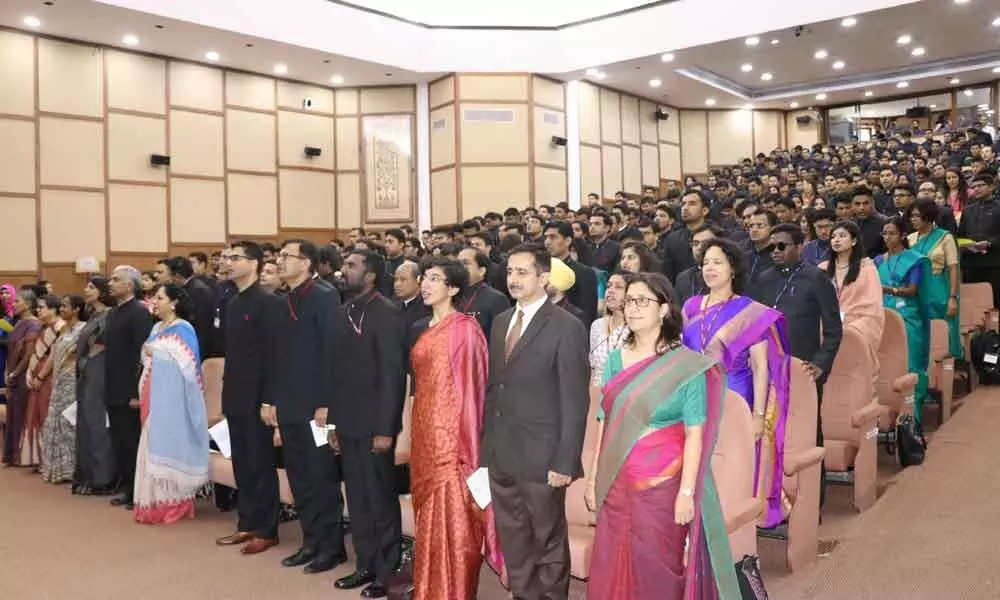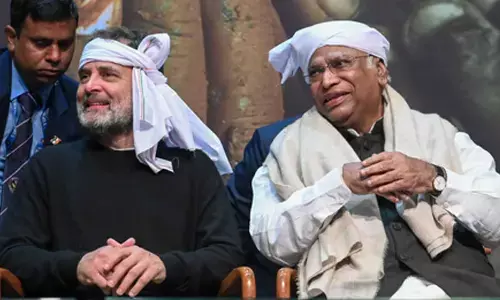Country needs daring youth, not passive beings

Nature presents us with beings and objects in different colours, shapes, sizes, tastes and smells - likewise one comes across people of all types – tall, short, dark, fair, lean or fat. Similarly, they may be smart or dull, peace-loving or laid-back.
So is the case with civil servants. No doubt, all are recruited by the Union Public Service Commission (UPSC), prepped for a career in the civil service at the Lal Bahadur Shastri National Academy of Administration (LBSNAA), and allotted to different States' cadres in the country for the rest of their service.
It is in that initial stage, but after that, the civil servants face the 'flight, flow or fight' syndrome. Incapable of adjusting to the alien environment, some people simply run away from the challenge, by applying for a transfer to another cadre. Others resign themselves to the inevitability of the situation and lead a reconciled existence devoid of either appreciation or dislike.
The third category recognises the challenge, faces it aggressively, overcomes it, and learns to enjoy the conversion of a seeming threat into an agreeable opportunity. Thereafter, socio- economic and cultural factors impact on their personalities. Exposure to businessmen, professionals, academicians, political leaders, senior colleagues and subordinates in service – apart from the general public – also has its own role to play in the manner in which they shape up as time passes.
Then there is the category of persons who wish to "do". Those who like to make things happen; the gifted ones, the ones who really matter in terms of their ability to make a concrete contribution to the process of growth and development; who "reach beyond their grasp", and are consumed by a desire to excel and leave a mark on the environment.
They are aware of their power to alter the nature of the environment around them and are consumed by a desire to contribute to the happiness of people whom their lives can touch. They absorb, radiate, exchange and morph into beings totally different from what they were initially.
There is this limerick which goes:There was a young woman named Parky Who went and married a darkie,She had four children One white, one black and two khaki In a somewhat similar manner, civil servants, thanks to the contributions made to their growth and development by the UPSC, the Academy and the ambience of the State of allotment, respectively, mature into products that reflect qualities inherited from all three sources of influence.
Sometime around halfway through their services, they settle into a definite mould; easygoing or hardworking, dynamic or cautious, sincere or casual or committed or indifferent. Broadly speaking, three categories of personalities emerge over time. There are those who join service, mechanically attend to duties entrusted to them week after week, month after month, year after year and, eventually, retire, quite content with neither having been affected by the environment, nor having impacted it in any manner.
They are quite content just to "be"; happy to flow with the tide, biding their time and taking things as they come. The environment barely affects them either positively or negatively. As a result, they complete their service and fade away, leaving themselves and things around them more or less as they were in the beginning. Yet another category comprises those who wish to learn and contribute but are conscious of their limitations.
They, therefore, work within the constraints which they know circumscribe their talent, energy and abilities. Finally, and regrettably, there will inevitably be those two will exploit the opportunities service offers, twist, turn and break the rules, and bend the laws, for personal gain.
The pity is some of these qualities do not always exist separately and in airtight compartments. It is not uncommon for instance, to find some of the most efficient persons being completely indifferent to the concept of honesty. On the other hand, there will be many, who are the very epitome of integrity and probity, but are completely incompetent.
There is, in fact, this story about an incompetent official whom his superior wanted to suspend. When asked why he wished to act against such an honest person, his reply was that the individual's entire salary was illegal gratification!
Talking about doers, one cannot help recollecting the historical contributions made by such distinguished civil servants as Sir Arthur Cotton and T N Seshan. Cotton conceptualised, and operationalised, the vast and complex dam and canal irrigation network on the Godavari river. He converted a veritable desert into prosperous rich wetlands. Little surprise, then, that, in the two Godavari districts till today, people keep his photograph at home and worship him like a God.
Then, in relatively recent times, we have had persons such as Seshan. Positioned in an environment identical to all his predecessors in terms of the policy and legal regimes, financial support, or administrative assistance, he managed, through sheer courage, boldness and determined effort, to transform the entire ambience surrounding the conduct of elections in the country.
His contribution to the creation of an atmosphere in which the conduct of free, fair and impartial elections - in a regular manner in the largest democracy in the world has earned the country laurels internationally.
Coming back to the question of the pattern and quality of the composition of the Indian Administrative Service over the States of the country, one finds that, on the whole the concept of an all India service has really worked robustly and satisfactorily. And so, has the arrangement of allotting officers to different States which become their parent cadres.
Over time, the barriers of culture and language having been surmounted, officers achieve harmony with the environment. Undoubtedly some differences such as those caused by considerations of caste, community, or the insider/outsider feeling, do create some fissures in the fabric of the State cadres.
On the whole, however, the feeling of oneness or the espirit de crops resulting from that the sense of belonging to one cadre invariably overcomes such minor challenges. In fact, any number of civil servants, after retirement, choose to settle down in the State of their allotment rather than the one to which they originally belonged, largely on account of the affection, comfort and sense of belonging the environment offers.
The 'be or do and become syndrome' applies equally well to entities such as languages, cultures, communities, composite groups, or even the States of our country. And, for that matter, even to countries. Take for instance a language like English.
Largely on account of the number of people who use it, it is constantly in a state of dynamic growth springing branches in all directions, sometimes in unexpected ones. On the other hand, languages such as, say, Sanskrit or Latin have not only stopped growing but have lost most of their lexicon, primarily owing to the dwindling numbers using them.
Likewise, a country like India, with its robust and aggressive approach to world affairs, finds its culture in a constant state of flux on account of continuous interaction with the external world. We have, on the other hand, countries like Sweden the Switzerland whose foreign policies have remained more or less frozen for decades.
And one has only to look at the manner in which the Jewish people have spread over to every nook and corner of the whole world or, for that matter, the Chinese who have made homes of their own in practically every part of the globe, to understand the power of initiative.
As with an individual, and, as we have seen, with a language, culture or religion the 'become and do syndrome' is an engine that fuels growth and development. Here is a lesson for our youth to resolve that, no matter what career they espouse, to resolve not to remain content with being passive beings, happy to exist but not wanting to live.
(The writer is former Chief Secretary, Government of Andhra Pradesh)










